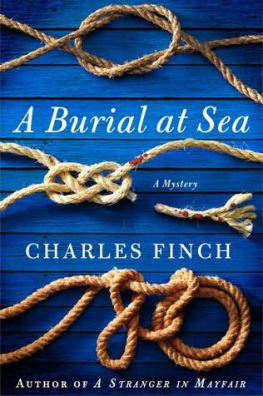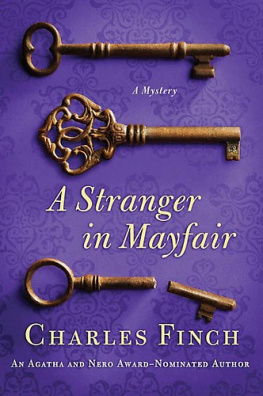Charles Finch - A Burial at Sea
Here you can read online Charles Finch - A Burial at Sea full text of the book (entire story) in english for free. Download pdf and epub, get meaning, cover and reviews about this ebook. year: 2011, publisher: St. Martins Press, genre: Adventure. Description of the work, (preface) as well as reviews are available. Best literature library LitArk.com created for fans of good reading and offers a wide selection of genres:
Romance novel
Science fiction
Adventure
Detective
Science
History
Home and family
Prose
Art
Politics
Computer
Non-fiction
Religion
Business
Children
Humor
Choose a favorite category and find really read worthwhile books. Enjoy immersion in the world of imagination, feel the emotions of the characters or learn something new for yourself, make an fascinating discovery.
- Book:A Burial at Sea
- Author:
- Publisher:St. Martins Press
- Genre:
- Year:2011
- Rating:5 / 5
- Favourites:Add to favourites
- Your mark:
- 100
- 1
- 2
- 3
- 4
- 5
A Burial at Sea: summary, description and annotation
We offer to read an annotation, description, summary or preface (depends on what the author of the book "A Burial at Sea" wrote himself). If you haven't found the necessary information about the book — write in the comments, we will try to find it.
A Burial at Sea — read online for free the complete book (whole text) full work
Below is the text of the book, divided by pages. System saving the place of the last page read, allows you to conveniently read the book "A Burial at Sea" online for free, without having to search again every time where you left off. Put a bookmark, and you can go to the page where you finished reading at any time.
Font size:
Interval:
Bookmark:

This book is dedicated with love to my grandmother, Anne Truitt, who loved sea stories. In memory.
Contents
Acknowledgments
A Burial at Sea required perhaps more research than the previous four Lenox books combined, and correspondingly there are a large number of people to thank. Chief among these is Jeremiah Dancy, naval historian at Lady Margaret Hall, Oxford, who patiently answered dozens of my questions, small and large, and offered me an excellent bibliography. The most useful of the books he recommended to me were The Navy in Transition by Michael Lewis and The Royal Navy: An Illustrated Social History, 18701982. by Captain John Wells. I also want to mention the two writers who inspired this books setting, C. S. Forester and the incomparable Patrick OBrian.
As usual, the team at St. Martins Press, from Charlie Spicer to Yaniv Soha to Andy Martin, was wonderfully generous and helpful. So was my agent, Kate Lee.
Thank you to Dennis Popp and Linda Bock. I owe them gratitude beyond reckoning for all their loyal support and friendship in recent years, and it seems appropriate that I completed this book in their beautiful sunroom.
Emily Popp and Mary Truitt each read early drafts, and each changed the final manuscript considerably for the better with their suggestions. Thanks and love to both of them.
For the name of the Bootle, thanks to Gerald Durrell, and for the name of the Lucy, thanks to Lucy.
Because I had so much help this time around, I must insist with more than the usual vehemence that all the books mistakes are my own.
CHAPTER ONE
He gazed out at the sunfall from an open second-floor window, breathing deeply of the cool salt air, and felt it was the first calm moment he had known in days. Between the outfitting, the packing, the political conversations with his brother, and a succession of formal meals that had served as shipboard introductions to the officers of the Lucy , his week in Plymouth had been a daze of action and information.
Now, though, Charles Lenox could be still for a moment. As he looked out over the maze of thin streets that crossed the short path to the harbor, and then over the gray, calm water itselfsmudged brown with half-a-dozen large ships and any number of small crafthe bent forward slightly over the hip-high window rail, hands in pockets. He was past forty now, forty-two, and his frame, always thin and strong, had started to fill out some at the waist. His trim brown hair, however, was still untouched by gray. On his face was a slight, careworn smile, matched by his tired, happy, and curious hazel eyes. He had been for much of his life a detective, more lately a member of Parliament for the district of Stirrington, and now for the first time, he would be something else: something very like a diplomat.
Or even a spy.
It had begun two months before, in early March. Lenox had been at home on Hampden Lane. This was the small street just off Grosvenor Square, lined with pleasant houses and innocuous shopsa bookseller, a tobacconistwhere he had lived nearly his whole adult life. For much of that time his best friend had lived next door to him, a widow named Lady Jane Grey whose family was also from Sussex: they had grown up riding together, fidgeting through church together: together. Just three years before, to his own confused and happy surprise, Lenox had realized how very much he loved her. It had taken some time to gather the courage to ask her to marry him. But he had. Now, in the winter of 1873, they were just getting used to the upside-down tumble their lives had taken. Their houses, side by side as they were, had been rebuilt to connect, and now they lived within a sprawling mishmash of rooms that matched their joined-up lives. They were a couple.
Lenox had been in his study that evening in March, making notes for a speech he hoped to give the following day in the House of Commons about India. There was a gentle snow outside the high windows near his desk, and the gaslights cast a dim and romantic light over the white, freshened streets.
There was a knock at the door.
Lenox put down his pen and flexed his sore hand, opening and closing it, as he waited for their butler, Kirk, to show the guest in.
Sir Edmund Lenox, Kirk announced, and to his delight Charles saw his older brothers cheerful and ruddy face pop around the doorway.
Ed! he said, and stood. They clasped hands. Come, sit by the fireyou must be nigh on frozen. Well, its been two weeks nearly, hasnt it? Youre in the country too often for my taste, I tell you that frankly.
Edmund smiled widely but he looked exhausted. In fact I wasnt at the house, so you cant lay that charge against me, he said. The house being the one they had grown up in together, Lenox House.
No? But you said you were going to see Molly and the
The baronet waved a hand. Security reasons, they say, but whatever it is we were at Lord Axmouths place in Kent, five of us, holed up with the admiralty, the chaps from the army, a rotating cast of ministers with Gladstone.
The prime minister. Charles furrowed his brow. What can it have been about?
In person Edmund Lenox looked very much like his younger brother, but he was perhaps less shrewd in the eyes, more open-faced. He served in Parliament out of a sense, not of ambition, but of duty, inherited from their father, and indeed preferred the country to London. Perhaps as a result he had a countryish air. He seemed heartier than his brother Charles.
This innocent, candid mien, however, concealed a more intelligent mind than one might immediately have suspected. It had been to Lenoxs great shock when he first learned, five or six years before, that Edmund wasnt the stolid backbencher he had always appeared to be, but in fact a leading member of his party who had declined important posts again and again, preferring to work behind the scenes.
Now he surprised Charles again.
You know something of my purview? Edmund said.
Something. Lenox himself was still a backbencher, but could say without undue immodesty that he was a rising man; long hours of work had seen to that. You advise the ministers, consult with the prime minister on occasion, find votesthat sort of thing.
Edmund smiled again, an unhappy smile this time. First of all, let me say that I come to ask a favor. I hope youll agree to do it.
With all my heart.
Not so quickly, for loves sake, Charles.
Well?
Edmund sighed and stood up from the armchair, staring for a moment at the low, crackling glow in the hearth. Might I have a drink? he asked.
The usual? Lenox stood and walked over to a small, square, lacquered table crowded with crystal decanters. He poured them each a glass of Scotch whisky. Here you are.
There are other parts of my job, that I havent mentioned to you before, said Edmund after a sip. A role I play that you might call moremore secret.
Lenox understood instantly, and felt well inside him some mixture of excitement, tension, surprise, and even a slight hurt that he hadnt heard of this before. Intelligence? he said gravely.
Yes.
What branch?
Edmund considered the question. You might call me an overseer, of sorts.
All of it, then.
Since the new prime minister came in, yes. I report to him. These weeks we have been
You might have told me, said Charles, his tone full of forced jocularity.
With comprehension in his eyes Edmund said, I would have, believe meI would have come to you first were I permitted to speak of it.
And why can you now? This favor?
Yes.
Well?
Its France, said Edmund. Were worried about France.
That doesnt make sense. Everything has been cordial, hasnt it? Uneasily so, I suppose, but
Next pageFont size:
Interval:
Bookmark:
Similar books «A Burial at Sea»
Look at similar books to A Burial at Sea. We have selected literature similar in name and meaning in the hope of providing readers with more options to find new, interesting, not yet read works.
Discussion, reviews of the book A Burial at Sea and just readers' own opinions. Leave your comments, write what you think about the work, its meaning or the main characters. Specify what exactly you liked and what you didn't like, and why you think so.










